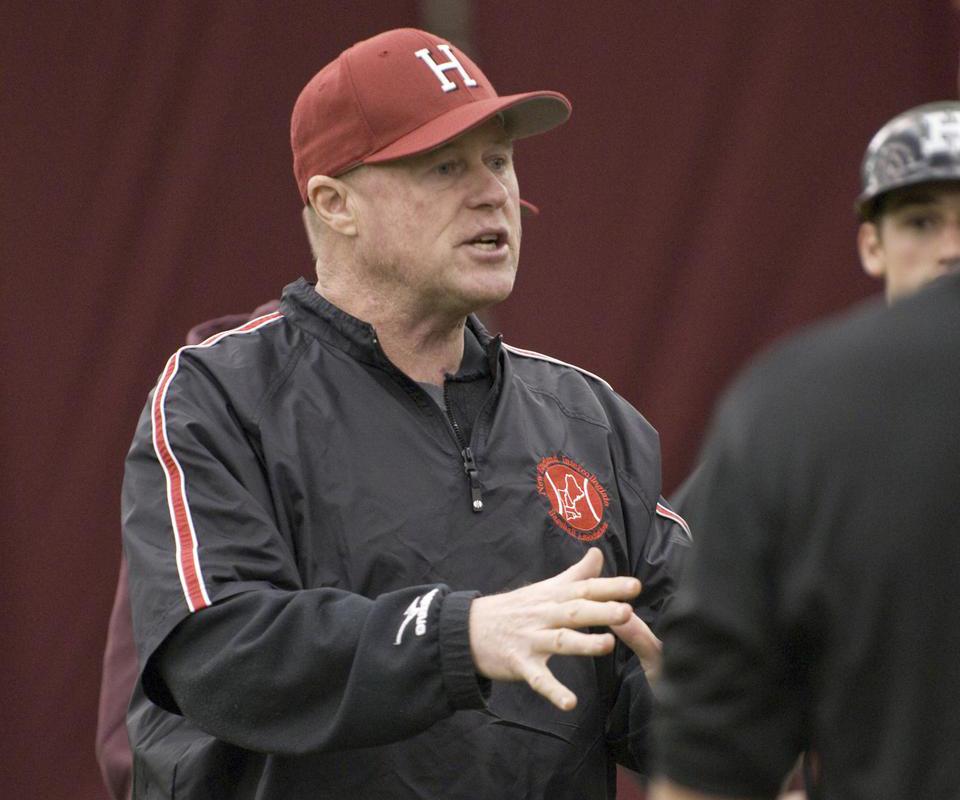
News
Summers Will Not Finish Semester of Teaching as Harvard Investigates Epstein Ties

News
Harvard College Students Report Favoring Divestment from Israel in HUA Survey

News
‘He Should Resign’: Harvard Undergrads Take Hard Line Against Summers Over Epstein Scandal

News
Harvard To Launch New Investigation Into Epstein’s Ties to Summers, Other University Affiliates

News
Harvard Students To Vote on Divestment From Israel in Inaugural HUA Election Survey
Walsh Remembered for Dedication to, Passion for Harvard Baseball

Harvard baseball coach Joe Walsh wasn’t a suit guy. He’d rather chop wood, sit on his back deck, or above all else, play some ball.
But one day in 1996, Walsh sat in a suit outside of then-Harvard Athletic Director Bill Cleary’s office. After 15 years coaching at Division III Suffolk University, Walsh was hoping to land the Crimson gig.
“He waited outside Bill Cleary’s office until Bill came out so he could say, ‘I really, really want the job,’” said Sandra Walsh, Joe’s wife.
Walsh was shocked when he got the job as Harvard’s first full-time baseball coach.
“At that time he thought, ‘There is no way I’d get that job,’” Sandra said. “He surprised everybody. It was so exciting for him to go from a D-III school to Harvard in the Ivy League. It was kind of like a Cinderella story.”
After living out the happily-ever-after end of his coaching fairy tale for 17 years, Walsh died in his home Tuesday morning at the age of 58. Sandra said that he likely died of a heart attack.
Walsh grew up in West Roxbury and fell in love with baseball at an early age. He attended Catholic Memorial School before playing college ball at Suffolk University in Boston.
Four years after graduating, Walsh became head coach at Suffolk. In 2009, he was inducted to the Suffolk Athletic Hall of Fame in recognition of his 15 years of coaching.
When Walsh came to Harvard, the Crimson had never had a full-time baseball coach. The previous year, Harvard had gone 10-25. In his first year on the job, Walsh turned the program around to guide his squad to a 23-17 finish.
The following year, Walsh won games against powerhouses University of Miami and UCLA, a step towards putting the Ivy League on the national map.
“He was one of the guys that made people across the country say, ‘Ivy League baseball doesn’t suck,’” Yale coach John Stuper said. “I was proud to be an Ivy League coach when he beat UCLA and he beat Miami.”
During 32 years of coaching, Walsh racked up 569 wins, including 347 at Harvard.
“He’s been one of the standard-bearers of our league,” Stuper said.
Stuper credited much of Walsh’s success to in-game tactics.
“He was one of the best in-game coaches that I have coached against,” Stuper said. “And I’ve coached against some big-time people.”
Beyond strategy, Stuper remembered Walsh for his love of the game.
“I remember the first time we played them, we beat them three out of four. And the next day Joe called us and said, ‘Gosh, that was a great series. That was great baseball,’” Stuper said. “If I had lost three out of four, I don’t know if I would have been so effusive in my praise of the other team or how great a weekend it was. He just loved good baseball.”
Stuper recalled Walsh pining for Ivy League teams to play four nine-inning games each weekend, because “in his eyes, that was real baseball.”
He also remembered Walsh’s care for his players, and Sandra said he showed that sort of concern off the diamond as well.
“Just the other day he was on his way to the dump and came home with a turtle in the back of the truck,” she said. “All the other cars whizzed by it, but he stopped so he could take it to the pond.”
Sandra said her husband was devoted to spending his free time with their four daughters, Tory, Holly, Katie, and Kasey. And she has seen the profound effects of his love—for his family, his athletes, and the game—since his passing.
“I’ve been getting a lot of phone calls this morning,” she said. “I have never in my entire life heard so many grown men crying.”
—Staff writer Jacob D. H. Feldman can be reached at jacobfeldman@college.harvard.edu.
Want to keep up with breaking news? Subscribe to our email newsletter.
